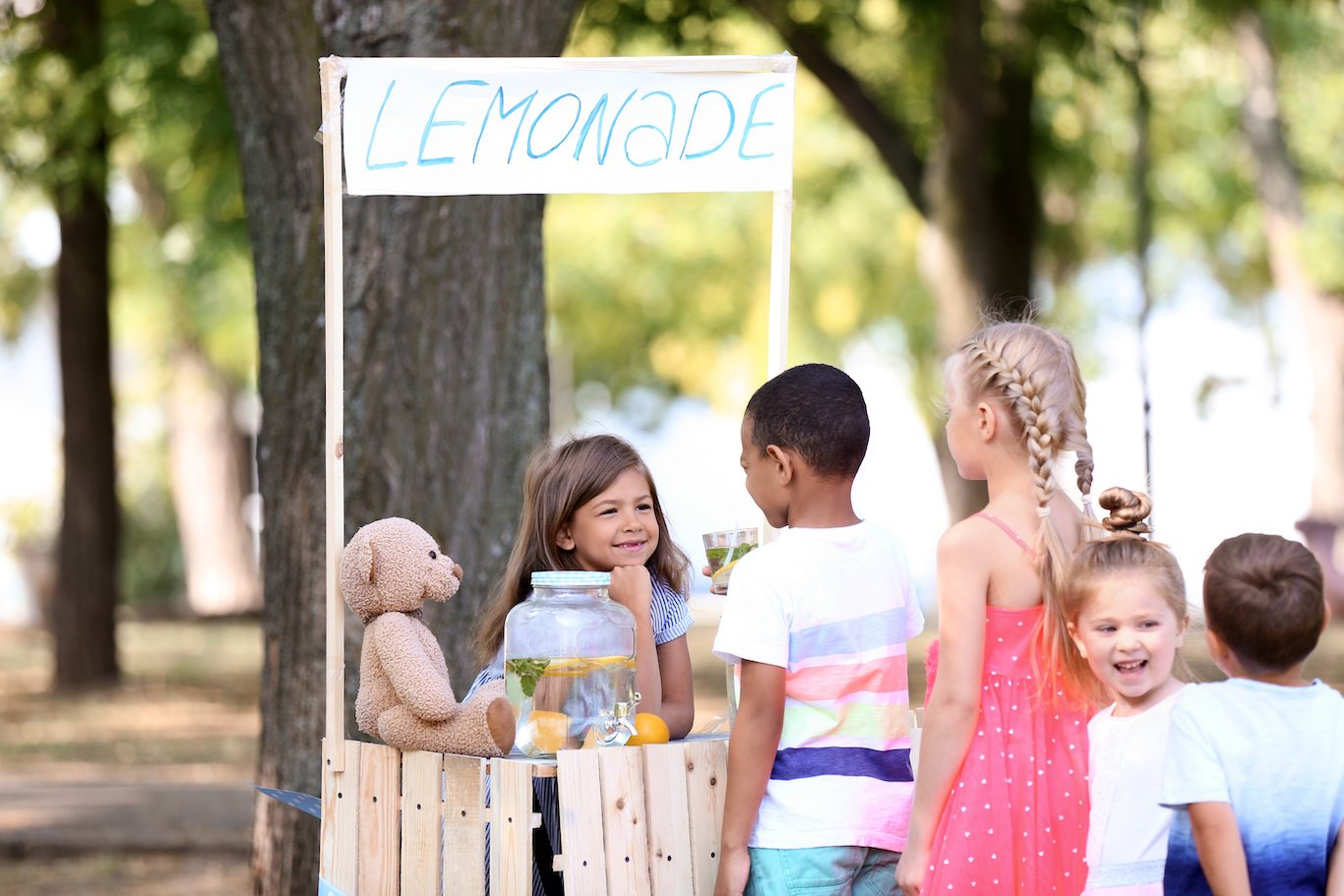Updated 6/4/24
One of the first entrepreneurial experiences many children have is operating a lemonade stand. It’s where some of us learn about the 4Ps of marketing, how to work with money, or how to follow through with an idea. And, just maybe for some, we catch the bug for business. For others, it’s just one-time fun that results in stickiness and sunburns.
The Lemonade Day organization believes lemonade stands help promote business skills, responsibility, financial literacy, goal setting, and teamwork.

Beyond the basics of business such as investing in your business – it takes money to make money, knowing your start-up costs and operating costs, and learning about profit and loss – operating a lemonade stand can also help students (and others) learn about:
-
KEEPING FOCUS AND ENSURING QUALITY – What’s your thing? Every business needs a thing – the product or service that adds value to and meets a need for the customer. This focus is the foundation of everything going forward. In this instance, if you’ve got lemons, add a few other quality ingredients and bam – lemonade! Basic lemonade can remind us to keep it simple. One product done really well, and marketed well, is enough to be successful.
-
BUSINESS, AND LIFE, TAKES FAILURE AND FOLLOW-THROUGH – Start. Try things. Don’t get caught in the weeds. It’s good to just begin and know you might have to make changes. Businesses evolve. And, know that you might even fail. Failure is important to experience and learn to navigate. More times than not, failure is a necessary part of business.
Failures at a lemonade stand, such as picking the wrong location or spending too much on supplies, though disappointing, are less expensive than those in bigger endeavors and give good direction for doing better next time. Perfection isn’t the goal; keeping a forward pace is.
-
RELATIONSHIPS COUNT – Businesses are rooted in relationships. Customers, suppliers, other businesses – all of these relationships matter. When you start a business, the support of those in your network is critical. You’ll need them to rally around you, connect you with resources, and share your work by word of mouth. Plus, having relationships means you have someone to turn to for guidance or to potentially borrow materials from.
 Customer service and connection with customers are the keys to building traction and loyalty. In this instance, it’s not about the lemonade, it’s about the experience the customers have and their interactions with you.
Customer service and connection with customers are the keys to building traction and loyalty. In this instance, it’s not about the lemonade, it’s about the experience the customers have and their interactions with you.
Here are a few other fun and/or related lessons from running a lemonade stand:
- Six lessons from the lemonade stand
- 7 business strategy lessons from a lemonade stand
- The lessons of a lemon stand – Teaching your children the fun way
- Lessons from a lemonade stand
Resources for Teaching Entrepreneurship to Kids
The inspiration for this blog came from a post about the Lemonade Day organization. What a cool concept that makes a refreshing impact! Per their site, “Lemonade Day is a fun, experiential program that teaches youth how to start, own and operate their very own business – a lemonade stand. Each year, in participating cities, youth have the opportunity to experience entrepreneurship by setting up their business during their city’s community-wide Lemonade Day.”
If you’re interested in teaching entrepreneurship and business, NFTE can be a key resource. “Network for Teaching Entrepreneurship (NFTE) is a global educational nonprofit focused on bringing the power of entrepreneurship to youth in low-income communities. NFTE’s rigorous programs are taught by a highly trained Teacher Corps, and NFTE students are supported by a diverse Volunteer Corps drawn from the local community, including business leaders and entrepreneurs. Since its founding more than 30 years ago, NFTE has trained thousands of teachers and educated more than a million young people worldwide.”
Junior Achievement has been around for a long time in the entrepreneurial education space. “Junior Achievement’s mission is to inspire and prepare young people to succeed. The inspiration piece comes from community volunteers who not only deliver our lessons, but share their experience. In the process, these volunteers serve as role models helping to positively impact young people’s perceptions about the importance of education, as well as critical life skills. Preparation involves our proven lessons that promote financial capability, work and career readiness, and business ownership.”
Oh, and August 20 is National Lemonade Day. Let’s toast to experiential learning with an ice-cold glass of lemonade. Cheers!
MORE RESOURCES:
- Entrepreneur: STEM skills + innovation
- The history of lemonade stands
- Entrepreneurship for kids: Lemonade stand freebie


